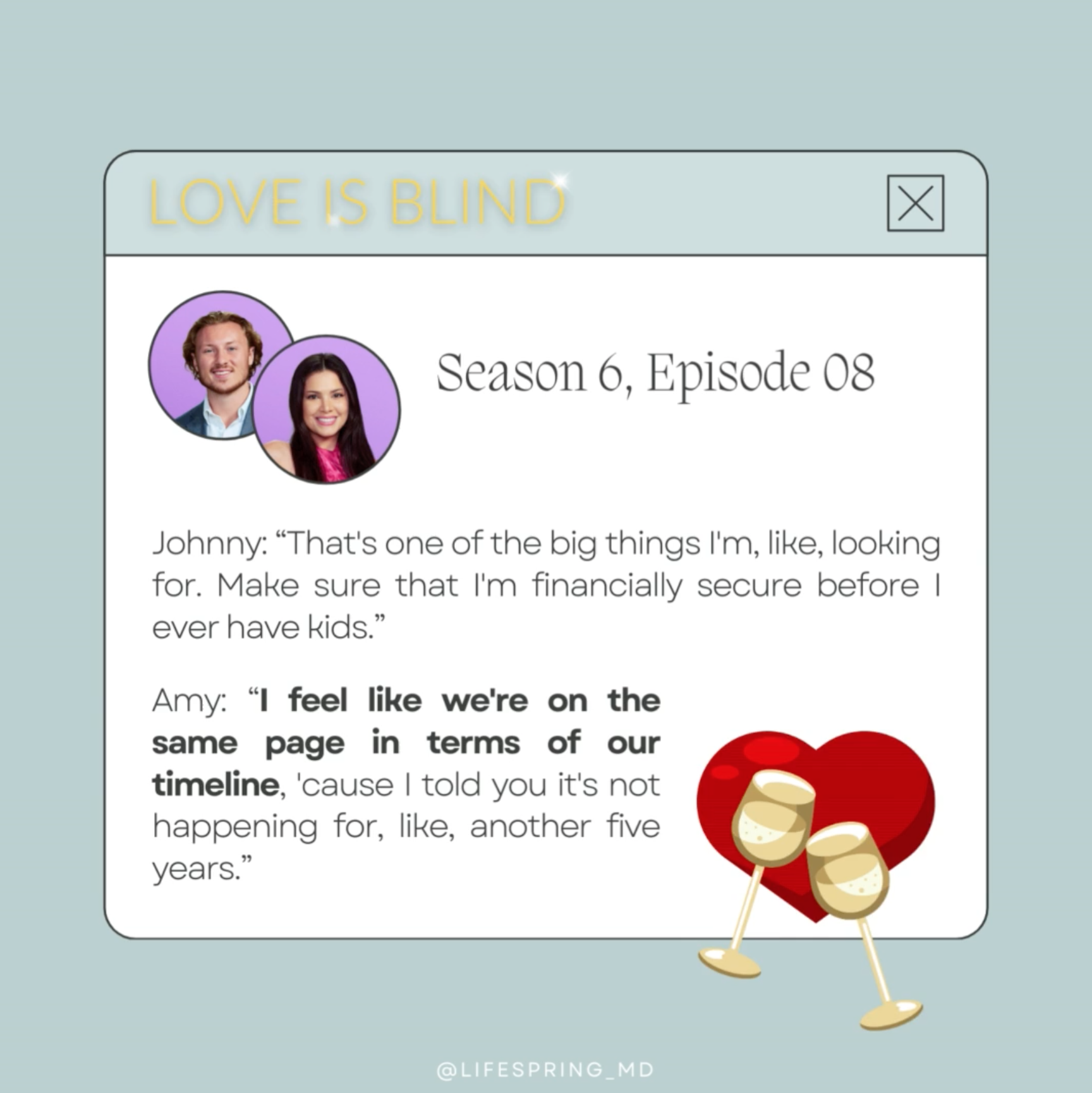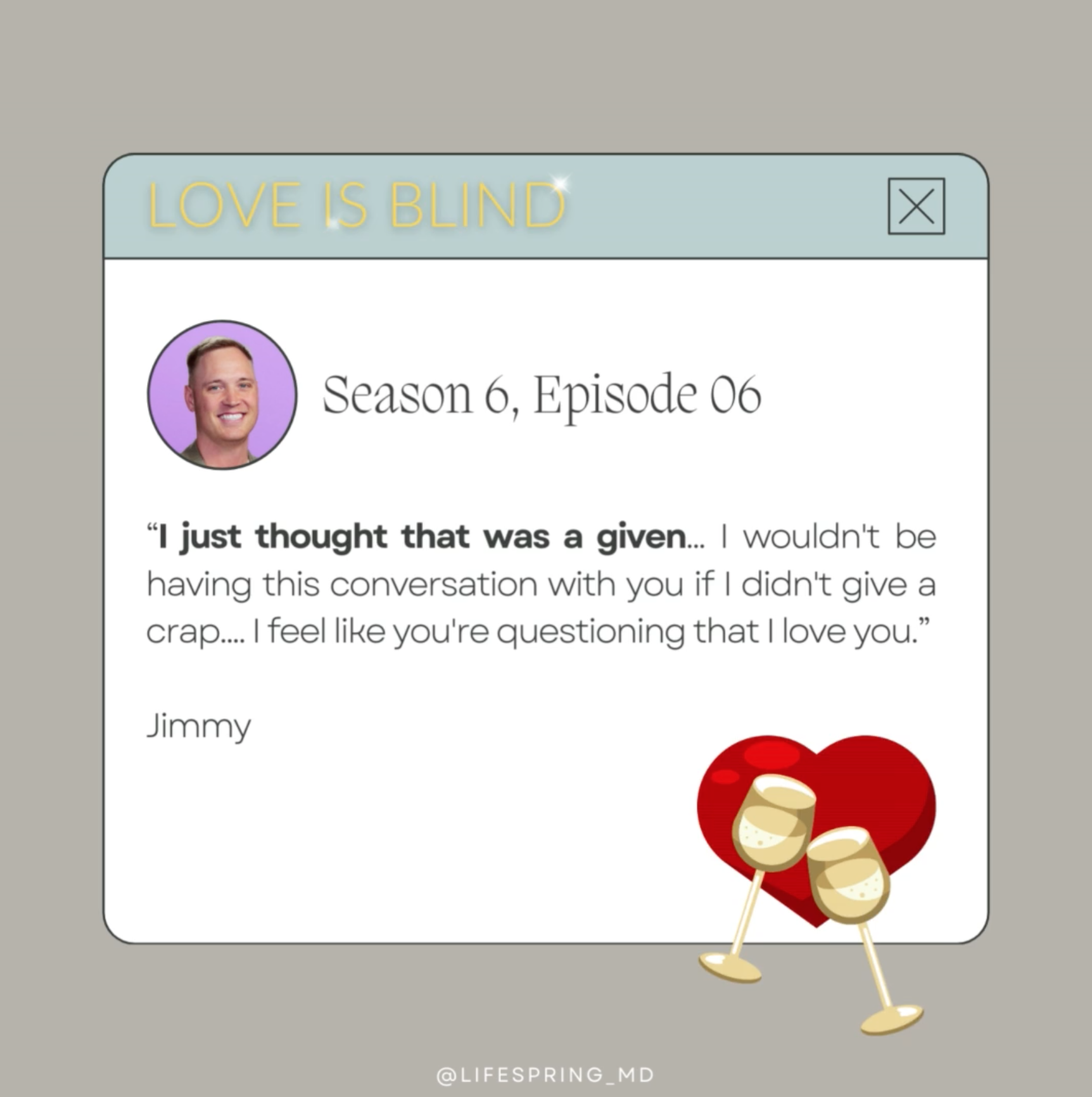Baltimore Area Therapists React to Love is Blind Season 6 with Tips on Communication and Relationships
If you’re a true Love is Blind fan, then you’re already caught up on everything that has happened in Season 6. Our Greater Baltimore team of therapists loves Love is Blind which is why we’ve decided to share our own relationship and communication tips based on the events that occurred in Season 6. We’ve shared them on social media, and now we’re sharing them here! We hope you enjoy some of our most comment-worthy moments from season 6!
“I just started seeing a therapist four or five months ago….And I usually give her one-word answers!” ~Matthew, season 6, episode 1
You all saw how well things were going for Matthew in the pods, right? Well, when you work with a therapist, that’s a relationship too! The way we show up in session with a therapist is often reflective of the ways that we show up in other relationships. Thank you for helping us demonstrate this point, Matthew!
This is actually great news, because therapists are trained to give you honest feedback about what’s showing up in session. Sometimes other people in our lives are not willing to be so honest. They often just back off and leave.
If you’re looking to work on relationships, the relationship with your therapist is a great place to start. If you can work on relationship skills there, you can transfer them to life outside of therapy.
And, if one word responses is where you’re starting from, we’ll meet you where you’re at! 😁
“This process has been good for me ‘cause I’m emotionally…I haven’t done therapy, and I really, like big up my accolades and different things about me ‘cause it’s like a little bit of an armor for me in a sense.” ~Clay, season 6, episode 3
Dating is an inherently vulnerable process. Just like on Love is Blind, you’ve got to weed people out, and the people you’re dating have to weed people out too!
No matter how confident you are, this very natural process stirs up a lot of our “stuff.” Insecurities and self doubt, questions about am I good enough, worthy enough, attractive enough can all pop up!
If you’re like Clay on Love is Blind, and your feelings are starting to bubble up, use that as an opportunity to practice self-awareness and seek out therapy if that’s what you need.
Hard Conversations
Throughout Season 6, we see couples having difficult conversations all of the time. It’s an important and necessary part of this process if they’re going to decide if they should be marrying someone. Initiating hard conversations, however, is never easy.
That’s why we’re sharing a strategy that you can use when you need to initiate a hard conversation, but don’t know how. The Gottmans call it the soft start up technique.
"I feel _____________about ____________. I really need __________________."
And, when your partner initiates a hard conversation, it’s important to actively listen, to acknowledge their feelings, and take ownership for your role, when appropriate!
Johnny and Amy: Talking about birth control
In my experience as a therapist with training in sex therapy, lots of people are uncomfortable having proactive conversations with their partners about sex, even though they are sexually involved with those partners! That’s why we’re so glad to see Johnny and Amy proactively having conversations about sex and birth control.
To this day, most forms of birth control are the woman’s responsibility, but the reality is that family planning and birth control are conversations that BOTH partners need to be involved in. So…how comfortable are YOU talking with partner(s) about birth control and family planning?
Consider: How do you speak up for yourself in these conversations, and how do you make sure you’re listening to your partner’s perspective, so that both of your wants and needs are heard. As you know, things seemed to have worked out for this committed and happy couple!
Kenneth: Communication 101
Sometimes we need to put the technology down! Actively listening means putting away distractions, and using non-verbal communication like eye contact to show that you are present and attentive. If hard conversations are difficult for you, try self-soothing by engaging in deep breathing, rather than numbing out or tuning out with technology.
Clay and AD: More Therapy Talk
Time and again, we hear Clay talking about going to therapy. We’re glad that Clay and AD are openly talking about therapy in a positive light, AND we hope that Clay will take that talk and turn it into action! If you’re the person who has been talking (and talking) about therapy too, the LifeSpring therapists will be here when you’re ready to take action!
Chelsea: Insecurity in Relationships
Throughout season 6, we see what appears to be a lot of insecurity from Chelsea. Because it’s a show and there’s editing involved, we’re not really sure if Chelsea IS really insecure OR if there is something Jimmy is doing (or not doing) that we’re not getting to see that’s contributing to her feeling that way. Here’s what we’ve got to say.
If you are generally NOT an insecure person, but you’re feeling insecure in a particular relationship, pay attention to what that’s about. Is your partner doing things that make you feel insecure such as not letting you see their phone, never leaving their phone around, or always setting their phone down face down, so that you can’t see the texts that come in? Does your partner say things to you that make you feel insecure? Are they refraining from doing or saying things that would be validating? In those cases, you may be feeling insecure because your partner is doing things that make you (and would make anyone) feel insecure.
There are times, however, when people feel insecure in relationships, even though their partner is doing and saying all the things that they can do to show that they are committed to the relationship and that they care. If that’s what’s showing up for you in your relationship, that might be an indicator that it’s time for you to do some of your own internal work. In that case, there’s nothing your partner can do to make you feel secure. In these cases, talking with a therapist can help.
Clay’s Mom on Breaking Cycles
In the therapy world, we often hear people talk about breaking generational cycles or breaking generational trauma. In that last episode of the season, we get to witness Clay’s mom having an honest, yet loving conversation with her former partner about the need to take accountability and ownership for his actions. She doesn’t want to see Clay taking his childhood experiences and bringing them with him into the future, only to affect his future relationship decisions.
Breaking family patterns requires insight and a willingness to change. It’s not always easy, and the change makers don’t always have the support from family members who are comfortable with the way that things have always been. Being the change-maker or pattern disrupter requires bravery, hard work, and support. There are lots of therapists out there who are ready to support you if that’s the kind of work you’re getting ready to do!
Here at LifeSpring, we recognize that signing up for a reality TV show is a big decision with lasting implications. We also recognize that what we see on TV has been edited for entertainment purposes and may not really reflect people’s experiences with complete accuracy. We’re grateful to the Love is Blind crew for providing us with entertainment and with teachable moments!
Search Our Other Blogs!
Interested in Counseling for Communication Skills and Boundary Setting?
If you’re a Marylander who knows that counseling is the direction you need to take, the therapists at LifeSpring Counseling Services are here to help. We offer online counseling services for mindfulness, depression, anxiety, trauma, and grief and loss. We also offer Brainspotting as a specialized service, and Brainspotting can be done online, too!
Here’s how you can get started! Online and in-person counseling for communication skills and boundary setting aren’t the only services offered at our Monkton, MD office.
The counselors and social workers at our Maryland office also offer counseling services for trauma, grief and loss, boundary setting, communication skills, and difficult life transitions. We also offer specialized counseling services including Brainspotting and spiritually-integrated counseling. Because we are located next to several local universities, we also work with college students and international students.




